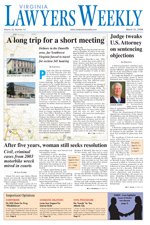Read the 2006 federal rules on e-discovery, but don’t ignore the old case law, a Richmond federal district judge told lawyers yesterday at a Richmond-area bench-bar conference.
The changes to Federal Rules 26, 33, 34 and 37 didn’t develop in a vacuum, and the case law framework for resolving discovery disputes is still relevant, regardless of changes in how information is stored and retrieved.
Senior U.S. District Judge Robert E. Payne said when lawyers come to his court for a “meet and confer” under Fed. R. Civ. P. 26(f), they fall into two categories: those who already have solved their discovery problems, including retrieval of ESI, or electronically stored information, and “those who don’t have any earthly idea what you’re talking about.”
Asked how he deals with the latter group, Payne joked, “I’ve got a taser gun.”
The e-discovery rules have had a salutary effect, according to Frank Telegadas, in-house counsel for Circuit City, because the “publicity around the rules got corporate America to understand this is here to stay … and resources need to be freed up to deal with” e-discovery issues.
Richmond lawyer John Craddock said it’s often easier to hash out discovery issues when it’s one corporate client against another. The parties’ common aim to survive, as in the old cold war doctrine of “mutually assured destruction,” encourages cooperation.
Or maybe it’s more like the Willie Nelson song: “You show me yours and I’ll show you mine.”
But pit a little-guy plaintiff against a big, bad corporation and the discovery contest may feel pretty one-sided. A company can’t always stave off a plaintiff determined to find a smoking gun.
Payne said the new rules “are part of the body of rules that’s been around since 1934, and individual plaintiffs and corporations have always said it’s going to cost a lot of money” to produce requested documents.
Before Payne went on the bench, he helped McGuire Woods handle uranium cases for Westinghouse, who had to retrieve old documents from storage in salt mines.
“Judges have been hearing this for years,” Payne said. “They don’t pay any more attention now than earlier. Pleas about the fact that it costs a lot of money fall fairly much on deaf ears because they sound exactly like the arguments I used to make years ago to try and save my clients money.”
“A corporation that chose to save money by putting their data in electronic form is not going to be heard to argue it costs too much to retrieve,” if the information is pertinent, Payne said.
Subscribe to:
Post Comments (Atom)

No comments:
Post a Comment